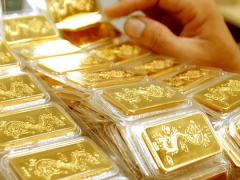Gold custody services expanded as gold depositing banned

Some have continued to mobilize long-term gold deposits in the form of gold custody services instead of mobilization.
With the form of "safe-keeping of gold" or "safe-keeping of assets", the banks mobilize gold for long-term deposits, mainly 12, 15 and 18-month terms.
Customers will still be entitled to interest rates when using a service like gold mobilization before with the monthly interest payment.
The interest rate in banks is also different, ranging from 2 to 3 per cent. Particularly, some banks raised interest rates up to 4.6 per cent, the highest for the 18-month period.
Specifically, Saigon Commercial Bank (SCB) pays a yield of up to 4.6 per cent per annum to encourage customers to park their gold in the lender’s safes.
Similarly, Dong A Commercial Joint Stock Bank (DongA Bank) and Nam A Commercial Joint Stock Bank (NamABank) have also offered to pay customers 3.4-3.6 per cent per year to store their gold in one of their safe deposit lockers.
Currently, there are about 10 credit institutions offering gold custody services, many of which do not allow customers to withdraw gold prior to due dates.
But some still permit clients to take out gold before maturity, provided that owners of the precious metal pay 0.05 per cent as penalty for premature withdrawal.
According to Circular No. 11/2011/TT-NHNN dated April 29, 2011, credit institutions are not authorized to mobilize gold, except for short term gold certificates of less than 12-month terms to pay customers on request.
The issuance of short term gold certificates by credit institutions would be terminated on May 1, 2012.
Many experts said that this is the way banks evade the law, though the central bank has yet to issue any written documents or specific provisions to distinguish the gold mobilization and custody services.
Banks began the race to mobilize gold before being banned from doing so last month with the popular rate of 3 per cent per year, but the earnings at some banks were pushed up over 4 per cent.
Banking expert Nguyen Tri Hieu told newswire Vnexpress late last week that it was a normal move by the banks, as gold depositing services would be banned.
On the other hand, when people still need to invest in gold bullions and the US dollar, banks will still be there to meet the demand by offering the services.
"The well-known principle for investors is 'do not put all our eggs in one basket', which will distribute a certain percentage, such as 60 per cent in the Vietnam dong, while the remaining 40 per cent is divided among gold and US dollars," he said.
Mr. Hieu also said that the keeping of assets, including gold, is a legal service offered by the banks.
As a rule, the property owners have to pay a small sum of fees to banks for the services.
But in this case, the banks paying interest for holding the gold for customers could be considered as a kind of gold mobilization variation.
Forex rate remains unchanged
The State Bank of Vietnam quoted the U.S dollar exchange rate at VND20,828 on Thursday, unchanged for more than four months, the longest string since it has been applied, but also the highest rate.
Commercial banks are allowed to apply an effective exchange rate of +/-1 per cent from the official exchange rate set by the central bank, accordingly, the ceiling price for a dollar today was VND21,036, but commercial banks mostly quoted dollar prices below the upper limit.
Some commercial banks lowered dollar prices today and the exchange rates applied ranged from VND20,810-20,850 for bid and VND20,875-20,900 for ask, respectively.
Vietnam’s foreign currency reserves have risen to the equivalent of nine weeks of imports from about 7.5 weeks as of mid-2011, newswire NDHMoney reported, citing the government’s latest report to the Standing Committee of the National Assembly last month.
Vietnam targets to adjust the exchange rate by between only 2-3 per cent this year, a goal that, if reached, means this will be the first year that the dong remains fairly stable after a long streak of depreciation over the past few years.
What the stars mean:
★ Poor ★ ★ Promising ★★★ Good ★★★★ Very good ★★★★★ Exceptional
Related Contents
Latest News
More News
- Hermes joins Long Thanh cargo terminal development (February 04, 2026 | 15:59)
- SCG enhances production and distribution in Vietnam (February 04, 2026 | 08:00)
- UNIVACCO strengthens Asia expansion with Vietnam facility (February 03, 2026 | 08:00)
- Cai Mep Ha Port project wins approval with $1.95bn investment (February 02, 2026 | 16:17)
- Repositioning Vietnam in Asia’s manufacturing race (February 02, 2026 | 16:00)
- Manufacturing growth remains solid in early 2026 (February 02, 2026 | 15:28)
- Navigating venture capital trends across the continent (February 02, 2026 | 14:00)
- Motivations to achieve high growth (February 02, 2026 | 11:00)
- Capacity and regulations among British areas of expertise in IFCs (February 02, 2026 | 09:09)
- Transition underway in German investment across Vietnam (February 02, 2026 | 08:00)

 Tag:
Tag:




















 Mobile Version
Mobile Version